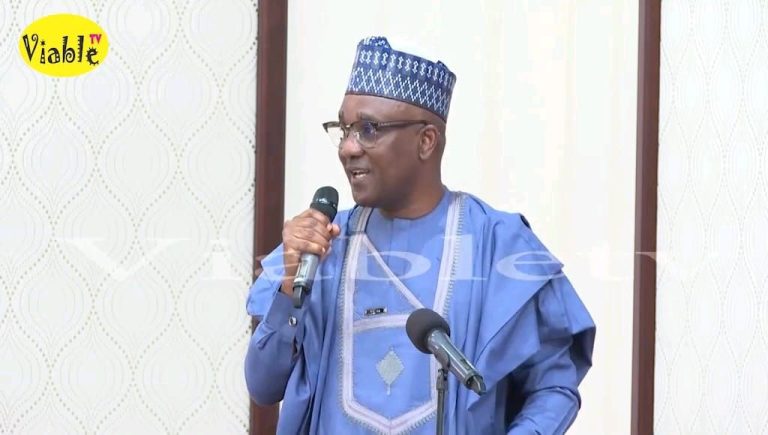In the annals of political history, moments of solidarity often serve as pivotal junctures that redefine allegiances and shape the trajectory of governance. Such was the occasion on which the Rt. Honourable Tajudeen Abbas, Speaker of the House of Representatives, led a delegation of former members of the Congress for Progressive Change (CPC) in a solidarity visit to President Bola Ahmed Tinubu. The atmosphere was charged with a sense of purpose, reverence, and an unwavering commitment to the ideals that bind them together as a political family.
As the Speaker commenced his address, he acknowledged the esteemed presence of dignitaries, emphasizing the significance of the gathering. “Your Excellency, the President and Commander-in-Chief of the Armed Forces of the Federal Republic of Nigeria, our leader, Asuwa Dr. Bola Ahmed Tinubu,” he began, his voice resonating with conviction. The careful selection of words underscored the respect and admiration that the former CPC members held for the President, setting the tone for a speech that would articulate their collective resolve to support his administration.
The Speaker’s assertion of unity was palpably felt as he declared, “I want to seize this opportunity, Mr. President, to assure you of the unconditional support of all former CPC members to your administration.” This declaration was not merely a formality; it was a reaffirmation of loyalty and a commitment to the ideals that had once united them under the banner of the CPC. In a political landscape often characterized by fragmentation and discord, this solidarity was a beacon of hope, a promise that the spirit of collaboration would endure.
In a poignant reflection on the past, the Speaker expressed gratitude for the President’s role in supporting the late former President of Nigeria. He recounted the collaborative efforts that had culminated in the realization of a shared dream, stating, “Thank you so much, Your Excellency, for the role you played in 2010.” This acknowledgement was more than a mere historical reference; it was an affirmation of the interconnectedness of their political journeys, highlighting how past alliances had paved the way for present endeavors.
The Speaker’s address also served as a reminder of the profound respect that the President had extended to the former President during his time of passing. “It was unprecedented in the history of Nigeria for any former President to be accorded such kind of respect,” he noted, emphasizing the significance of this gesture in the context of national unity and healing. Such acts of compassion and respect resonate deeply within the political fabric of a nation, fostering an atmosphere of mutual respect and understanding.
As the speech progressed, the Speaker articulated a vision for the future, one that was anchored in collective action and grassroots mobilization. “On behalf of the entire former CPC members, I inform you and assure you that we have resolved to create former CPC members for Asiwaju in all our states,” he proclaimed. This call to action was not merely a strategic maneuver; it reflected a genuine desire to galvanize support for the President’s administration, ensuring that the ideals they cherished would continue to thrive.
The emphasis on grassroots mobilization was particularly noteworthy. The Speaker’s commitment to cascading support down to local governments, wards, and polling units exemplified a proactive approach to political engagement. It underscored the understanding that true change is often nurtured at the grassroots level, where the voices of the people can be amplified and their needs addressed. This vision of a united front, working in concert with the President, resonated strongly with the audience, reinforcing the notion that collective action is essential for effective governance.
In a reflective moment, the Speaker acknowledged the unprecedented representation of CPC members within the current administration. “This is the very first time, Your Excellency, that we have three governors, current, that are serving under this administration that were of CPC extraction,” he noted with pride. This recognition of progress was not merely a celebration of numbers; it was a testament to the enduring legacy of the CPC and its capacity to adapt and thrive within the evolving political landscape of Nigeria.
As the address drew to a close, the Speaker’s words were imbued with a sense of hope and determination. “May Almighty continue to preserve you. May you live long to actualize all the good plans you have for our country,” he concluded, invoking blessings not only upon the President but also upon the nation itself. This invocation of divine guidance underscored the belief that leadership is not merely a political endeavor but a sacred trust that requires wisdom, compassion, and a steadfast commitment to the welfare of the people.
In reflection, the solidarity visit led by the Rt. Honourable Tajudeen Abbas was more than a mere political gathering; it was a reaffirmation of shared values, a celebration of past achievements, and a commitment to future endeavors. The speech delivered was not only presidential in its tone but also deeply resonant with the aspirations of a nation yearning for unity and progress. It served as a reminder that, in the face of challenges, the strength of a nation lies in its ability to come together, to forge alliances, and to work collaboratively towards a brighter future.
The solidarity visit encapsulated the essence of political camaraderie, illustrating how shared experiences and mutual respect can pave the way for collective action. As the former members of the CPC pledged their unwavering support to President Bola Ahmed Tinubu, they not only reaffirmed their commitment to his administration but also ignited a renewed sense of hope for the future of Nigeria. In a world often fraught with division, such moments of unity stand as a testament to the enduring power of collaboration and the belief that, together, they can chart a course towards a prosperous and harmonious nation.


